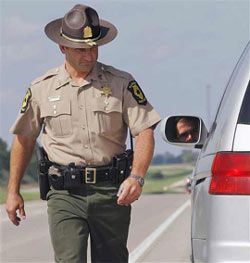By PETE YOST
Associated Press
WASHINGTON — The Supreme Court on Monday questioned whether evidence in criminal cases should be suppressed following arrests that violate state laws.
 (AP Photo/Seth Perlman) |
At issue is the cocaine conviction of David Lee “Chubs” Moore, stopped by Portsmouth, Va., detectives for driving on a suspended license. Instead of letting Moore go after writing a court summons as Virginia law requires, police arrested him and found crack cocaine in his jacket.
The Virginia Supreme Court threw out the case, saying the search was unconstitutional.
Justice Antonin Scalia pointed out that the court previously has allowed arrests for crimes as minor as not wearing seat belts.
An arrest is constitutionally lawful if there is probable cause to believe the person committed a crime, Deputy Virginia Solicitor General Stephen McCullough told the justices.
“Any crime at all ... jaywalking?” asked Justice Ruth Bader Ginsburg.
Yes, McCullough replied.
Chief Justice John Roberts and Justice David Souter expressed concern over letting state laws like Virginia’s dictate whether searches unrelated to the arrest are valid.
The laws of the 50 states are “pretty variable,” said Roberts. Souter pointed to the need for police to protect themselves by searching a person for weapons following any arrest.
But the arrest in Moore’s case was unlawful, attorney Tom Goldstein told the justices.
Attorneys general from 18 states have lined up in support of Virginia prosecutors. The American Bar Association, the National Association of Criminal Defense Lawyers and the American Civil Liberties Union are siding with Moore.
Just because Moore’s arrest violated state law does not make the search unconstitutional, argues the Virginia attorney general’s office.
To conduct a seizure or search under the Fourth Amendment, the government must have a good reason to do so, Moore’s lawyers said in court papers. “Here they have none.”
When detectives initially stopped Moore, there was a delay in arresting him because he had a large and “very upset” dog in the vehicle. After confirming Moore was driving with a suspended license, he was handcuffed. Because of an unexplained miscommunication, the detectives did not immediately search Moore.
They called animal control officers to pick up the dog. Forty-five minutes later, the detectives drove Moore to a hotel room where he had been staying. At that point, they searched him and found the crack cocaine in his jacket.
Later, a Virginia judge asked why Moore was not issued a traffic summons and sent on his way, as required by state law.
“Well, we were still in the middle of the investigation; the investigation was not complete yet,” the detective replied. “We were, pursuant to the traffic stop ... also conducting a narcotics investigation.”
Justice John Paul Stevens questioned the time lag between the arrest and the search. Is it an “ongoing arrest?” Stevens asked. “That’s kind of a new concept.”
McCullough replied that the delay hadn’t been raised as an issue in the case previously, meaning it could not be injected now.
The case is Virginia v. Moore, 06-1082.

